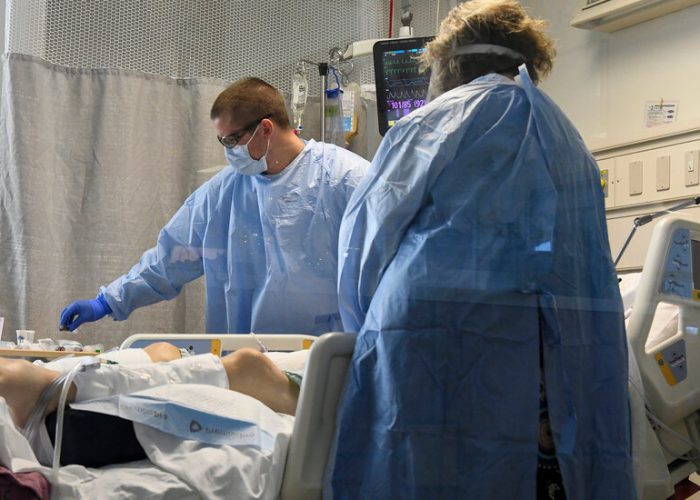There wasnt a single I.C.U. bed available in Alabama on Wednesday, a possible sign of what other states may confront soon amid a deadly surge of new infections in parts of the United States with low vaccination rates.
I.C.U. beds are filling up across Southern states, and Alabama is one of the first to run out. The Alabama Hospital Association said on Wednesday night that there were negative 29 I.C.U. beds available in the state, meaning there were more than two dozen people being forced to wait in emergency rooms for an open I.C.U. bed.
The situation has grown desperate in Alabama, one of several states reporting a wave of cases driven by the highly contagious Delta variant and low vaccination rates.
Last week, at least two hospitals in Houston were so overwhelmed with virus patients that officials erected overflow tents outside. Elsewhere in Texas, in Austin, hospitals were nearly out of beds in their intensive care units. And in San Antonio, cases reached levels not seen in months, with children as young as 2 months old tethered to supplemental oxygen.
Arkansas hospitals were also close to capacity.
Only 47 percent of people in Alabama are at least partially vaccinated, far lower than the national rate of 60 percent, according to a New York Times database.
On Monday, the seven-day hospitalization average hit 2,603, up from a low of 252 on June 26. Only Januarys numbers were higher, when the seven-day average peaked at more than 3,300 on Jan. 10.
Gov. Kay Ivey of Alabama said last month that the surge in new cases was down to the number of unvaccinated people. On Friday, she reinstated Alabamas state of emergency, which had expired in early July, in an effort to expand hospital capacity.
Alyssa Lukpat
Cubas health care system, long a source of national pride, is in acute distress, particularly in distant provinces.
After fending off the coronavirus last year, Cuba has been ravaged this summer by the highly contagious Delta variant, which has sent case rates soaring and swamped the countrys medical system.
More than 8,600 new cases were reported on Tuesday, about six times as many as the number of new cases just two months ago, according to Ministry of Health figures.
Oxygen supplies for Covid-19 patients are running low, and the factory that produces the nations canisters is currently shut down.
Mortuaries and crematories have been overwhelmed. The city of Guantánamo, for example, is dealing with a surge of deaths that on some days climbs to about eight times the usual number, a government official said. Cubans are posting heart-wrenching videos of dead relatives, saying that their loved ones died for lack of medical care.
This past weekend, after Cubas prime minister, Manuel Marrero Cruz, said that Cubans were complaining more about doctors and their poor service than they were about the shortages, nearly two dozen young physicians and medical students took to social media to state, one by one: I am publicly declaring that doctors are not to blame for the collapse of the public health system.
The move was a daring step in Cuba, where any public show of discontent may result in the loss of employment or even prison.
Cubas president, Miguel Díaz-Canel Bermúdez, acknowledged recently that the pandemic had exceeded the capacity of the Cuban health care system, but he blamed the U.S. trade embargo for the shortages the country suffers.
While the pandemic has strained medical systems around the world, the calamity in Cuba is particularly significant because the government has for decades held its free health care system up as a signal accomplishment of the socialist revolution. But the growing crisis has revealed a frayed system that, while often producing medical breakthroughs, is also denounced as ill-equipped and underfunded.
The Cuban Ministry of Health did not respond to several requests for comment.
Alexander J. Figueredo Izaguirre, a doctor in the Cuban province of Granma, said he was fired this year after he criticized the poor state of the countrys hospitals following the death of his grandfather.
The funeral homes cant cope, the hospitals cant cope, the clinics cant cope, he said. We have been struggling for a year and a half in this battle against this disease without weapons when hundreds and thousands of people are dying.
Frances Roblesread more
Alabama Has Run Out of I.C.U. Beds, Officials Say


